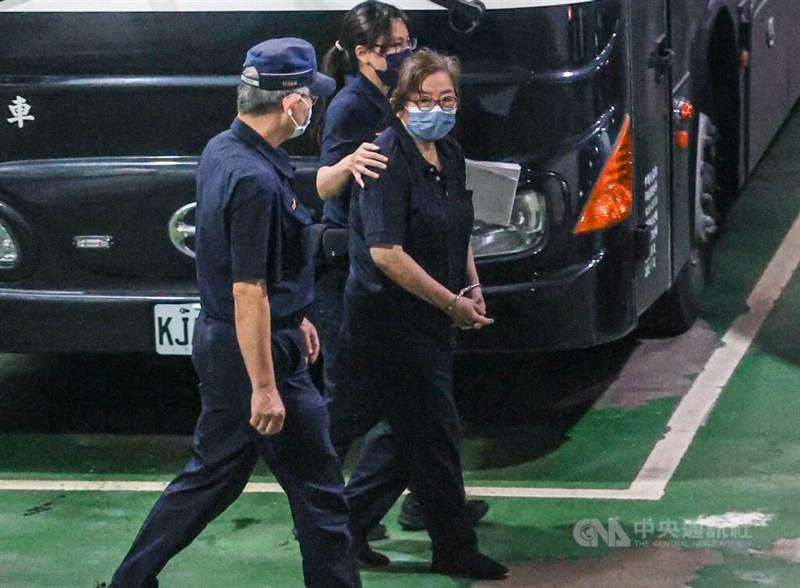The Taipei District Court yesterday ordered that three senior staff from the Chinese Nationalist party's (KMT) Taipei branch remain in detention over their alleged involvement in the forgery of thousands of signatures to recall two Democratic Progressive Party (DPP) lawmakers.
The court cited the risk of evidence tampering and collusion in its decision to keep KMT Taipei chapter director Huang Lu Chin-ru (黃呂錦茹), secretary-general Chu Wen-ching (初文卿) and secretary Yao Fu-wen (姚富文) in custody.
The three directed or participated in the fabrication of 5,211 signature forms — 2,537 related to the recall of DPP Legislator Wu Pei-yi (吳沛憶) and 2,674 for DPP Legislator Rosalia Wu (吳思瑤) — with forged entries accounting for 96 percent and 94 percent of the forms respectively, prosecutors said.

Photo: CNA
The Taipei District Prosecutors' Office on Monday indicted Huang Lu, Chu and Yao for allegedly contravening the Personal Data Protection Act (個人資料保護法) and engaging in document forgery.
Forging recall documents undermined not only the legitimacy of the recall process, but also Taiwan's democratic and electoral systems, the court said.
While Chu and Yao admitted wrongdoing, there were inconsistencies in their statements and signs of coordination among them, the court said.
Huang Lu has denied the charges.
The three, who were already in custody prior to yesterday's court hearing, were among five people indicted on Monday.
The remaining two — Lai Yi-jen (賴苡任), the organizer of the recall campaign against Rosalia Wu, and Chen Kuei-hsun (陳奎勳), a KMT district office executive — were not detained.
Fifteen other KMT staff and volunteers who cooperated with the investigation were granted deferred prosecution.
The case is part of a broader wave of investigations into alleged forgery in recall drives across Taiwan.
For a recall initiative to reach the voting stage, campaigners must collect the signatures of at least 1 percent of a constituency's eligible voters in the first stage and 10 percent of eligible voters in the second stage.

Nipah virus infection is to be officially listed as a category 5 notifiable infectious disease in Taiwan in March, while clinical treatment guidelines are being formulated, the Centers for Disease Control (CDC) said yesterday. With Nipah infections being reported in other countries and considering its relatively high fatality rate, the centers on Jan. 16 announced that it would be listed as a notifiable infectious disease to bolster the nation’s systematic early warning system and increase public awareness, the CDC said. Bangladesh reported four fatal cases last year in separate districts, with three linked to raw date palm sap consumption, CDC Epidemic Intelligence

Two Taiwanese prosecutors were questioned by Chinese security personnel at their hotel during a trip to China’s Henan Province this month, the Mainland Affairs Council (MAC) said yesterday. The officers had personal information on the prosecutors, including “when they were assigned to their posts, their work locations and job titles,” MAC Deputy Minister and spokesman Liang Wen-chieh (梁文傑) said. On top of asking about their agencies and positions, the officers also questioned the prosecutors about the Cross-Strait Joint Crime-Fighting and Judicial Mutual Assistance Agreement, a pact that serves as the framework for Taiwan-China cooperation on combating crime and providing judicial assistance, Liang

The manufacture of the remaining 28 M1A2T Abrams tanks Taiwan purchased from the US has recently been completed, and they are expected to be delivered within the next one to two months, a source said yesterday. The Ministry of National Defense is arranging cargo ships to transport the tanks to Taiwan as soon as possible, said the source, who is familiar with the matter. The estimated arrival time ranges from late this month to early next month, the source said. The 28 Abrams tanks make up the third and final batch of a total of 108 tanks, valued at about NT$40.5 billion

Reports of Taiwanese going missing, being detained or interrogated, or having their personal liberties restricted in China increased about fourfold annually last year, the Mainland Affairs Council (MAC) said yesterday. Last year, 221 Taiwanese who traveled to China were reported missing, were detained and interrogated, or otherwise had their personal freedom restricted, up from 55 the previous year, the council said. Reopening group tours to China would be risky, as it would leave travelers with no way to seek help through official channels after Beijing shut down dialogue between the associations tasked with handling cross-strait tourism, the MAC said. Taipei’s Taiwan Strait Tourism